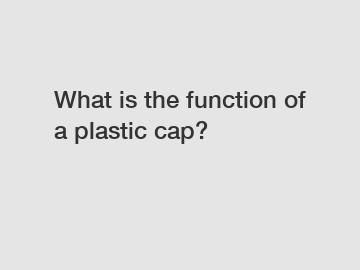What is the function of a plastic cap?
When it comes to packaging, there are many small components that play a crucial role in keeping products safe and secure. One such component is the plastic cap. These caps are often overlooked, but they serve an important function in ensuring the integrity of the product inside. Let's delve into the world of plastic caps and explore their various functions.
Plastic caps are commonly used in a wide range of industries, from food and beverage to pharmaceuticals and cosmetics. They are often the final touch on a product, providing a seal that prevents leakage and contamination. But the role of a plastic cap goes beyond just sealing a product – it also serves to protect the contents from external elements such as dust, dirt, and moisture.
One of the key functions of a plastic cap is to maintain the freshness and quality of the product. For example, in the food and beverage industry, plastic caps are used to seal bottles and containers to prevent air from entering, which can cause the product to spoil. This is especially important for products like juices, sauces, and condiments that need to be stored for extended periods.

Plastic caps also play a critical role in preventing spills and leaks, which can be a costly and messy problem for manufacturers. By ensuring a secure seal, plastic caps help to minimize waste and ensure that the product reaches the consumer in pristine condition. This is particularly important for products that are transported over long distances or stored for extended periods.
In addition to sealing and protecting the product, plastic caps also serve a functional purpose in terms of usability. Many caps are designed with features such as tamper-evident seals, child-resistant closures, and easy-grip designs to make them convenient for consumers to use. These features not only enhance the overall user experience but also provide added safety and security for the product.
Furthermore, plastic caps can also be customized to meet specific requirements for different products. For example, in the pharmaceutical industry, caps may need to be child-resistant to prevent accidental ingestion, while in the cosmetic industry, caps may need to be aesthetically pleasing to appeal to consumers. By offering a variety of options in terms of design, color, and functionality, plastic caps can be tailored to meet the unique needs of each product.
Another important function of plastic caps is to provide branding and marketing opportunities for companies. Caps can be used as a platform to display logos, slogans, and other branding elements, helping to create brand recognition and promote brand loyalty. This is particularly important in crowded markets where products need to stand out from the competition.
Overall, the function of a plastic cap goes far beyond just sealing a product – it plays a vital role in maintaining product integrity, preventing spills and leaks, enhancing usability, and providing branding opportunities. As a small but essential component of packaging, plastic caps are an integral part of the overall consumer experience.
In conclusion, while plastic caps may seem like a minor detail, they serve a critical function in ensuring the safety, quality, and usability of products. From sealing and protecting to branding and marketing, plastic caps play a versatile role in the packaging industry. So, the next time you unscrew a plastic cap, remember the important function it serves in preserving the integrity of the product inside.
If you are looking for more details, kindly visit casing thread protectors, pipe thread protection, Hydraulic Bucking Unit.
147
0
0

Comments
All Comments (0)